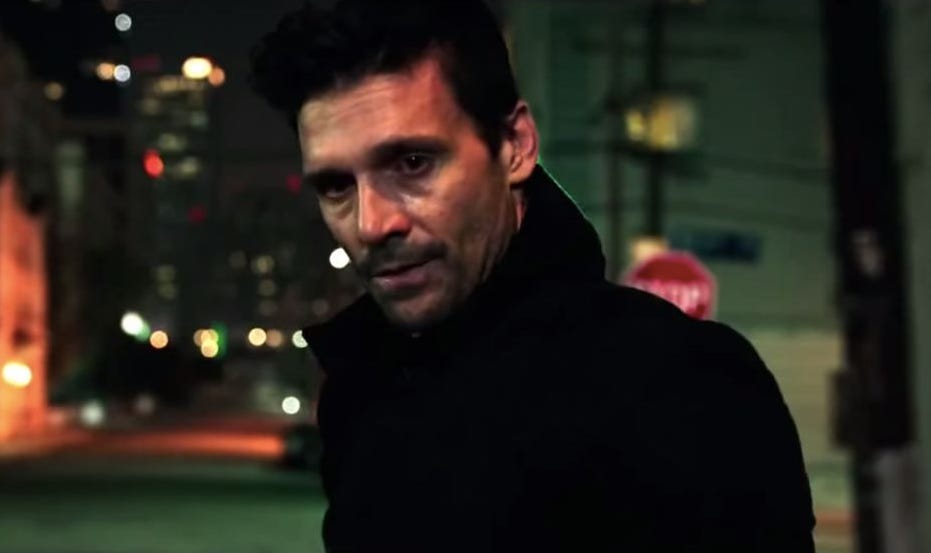The Psychology of The Purge
"The Forever Purge" opens up on July 2 and Adam Aasen examines the psychology behind the popular horror/thriller franchise, which has spawned six movies
“Tonight we will see the good and evil in everyone.”
— “The First Purge.”
For (soon-to-be) six movies, “The Purge” franchise has raised the idea that the scariest thing isn’t a bunch of masked murderers gathering at your front door.
It’s the idea that there might be murderer inside of all of us.
It’s an idea raised in several horror/thriller films, my most favorite being Stanley Kubrick’s “The Shining.”
While “The Purge” movies don’t necessarily make their point very well, (every protagonist in the movies ends up killing out of survival or self defense and not wiping out innocent people) the central idea is that every person has a murderous rage inside of them that would come out if there were no laws or police to prevent that.
"Look I know that this is difficult to understand at your age but tonight allows people a release for all the hatred, and violence, and aggression that they keep up inside them."
— “The Purge.”
If you haven’t seen the movies, the premise is that the United States has deteriorated with rising crime, rampant poverty and a bankrupt government. A new political party takes power and decides that one night a year everyone can break any law — including murder — for 12 hours. It’s sold as a “release” that prevents crime the other 364 days a year.
In my previous examination of this series (leading up to the new installment “The Forever Purge” which opens on July 2), I’ve already explained how The Purge wouldn’t actually reduce crime or eliminate poverty, but now I’ll explain why the idea of a murderous cathartic release isn’t actually based in reality.
“Blessed be the New Founding Fathers for letting us Purge and cleanse our souls. Blessed be America, a nation reborn. Well, it's been a long journey to get away from the lies and the self-deception to this place of knowledge and awareness of who we really are. People of flesh, immensely flawed. It's hard to see the ugly truth. But change can only come from acceptance. And change we must, as it is our godly duty to get rid of the fury and the hatred that poisons our souls, makes us sick. Makes us ugly. Tonight, we, the leaders of this great country, will sin, scour, sanitize and sterilize our souls until we are free again, and this country will be better for it. We are not hypocrites! We practice what we preach. Purge and purify! Say it with me. Purge and purify! Purge and purify! Purge and purify!”
— “The Purge: Election Year.”
There’s a popular idea that releasing anger is healthy and that if you can find a way to act your anger out, then you’ll be less angry.
That isn’t 100 percent true. While it’s important to not bottle up anger, psychologists explain it’s important to release it in a calm and peaceful way.
Try yoga or meditation.
Perhaps taking a nap or exercising.
Yelling or screaming or acting out in violence is actually proven to heighten anger and aggression rather than releasing it.
Aggression breeds aggression.
Often what we find is often people who angrily commit violent acts are actually misdirecting other feelings.
Say someone cuts you off in traffic and you track down their car and kill them (like Russell Crowe in the underrated thriller “Unhinged”). You weren’t actually that angry that someone cut you off in traffic. You’re actually mad that you can’t find a job. You’re angry about your sick relative. You’re frustrated at your lot in life. Someone cutting you off in traffic was just the object that you direct all of your frustrations at.
When it’s over, you actually feel more helpless than powerful because you realize taking a life doesn’t fix the real problems.
This is exemplified in “The Purge: Anarchy” with Frank Grillo’s character of Leo Barnes, who is a LAPD sergeant who goes out on Purge Night to avenge the death of his son, who was killed by a drunk driver who got off on a technicality.
“You want to tell us what we're doing here?
Do you see that house on the corner?
The owner of that house killed my son 12 months ago.
Nicholas was coming home from school, and he swerved off the road.
That bastard's blood alcohol level was three times the legal limit, but, you know, he got off on a technicality, so...
Him and his wife and his two little kids, well, they live in that house, happily ever after.
Two weeks ago, I came here and I disabled his back barricade.
That's what we're doing here.”
— “The Purge: Anarchy.”
Grillo’s character eventually relents and decides to not act on his revenge fantasies, realizing it won’t bring his son back.
“Look, Purging, no matter what the reason, is wrong.
Killing doesn't help anything.
It doesn't heal someone.
Enough. Enough.”
— “The Purge: Anarchy”
Revenge isn’t the same thing as justice and the wounds that we have can’t be healed by violence. It’s an internal struggle that must be reconciled.
“An eye for an eye will only make the whole world blind.”
― Mahatma Gandhi
In “Purge: Election Year,” we see a gang of spoiled teenagers in frilly dresses and masks who try to kill a middle-class shopkeeper who scolded them for shoplifting. The leader, dripping with blood after she murdered her parents, yells, “I want my candy bar.” It seems this bratty teen isn’t actually that worked up about some chocolate. And killing her parents didn’t seem to release any anger in her system.
It appears her psychological issues can’t be solved by a 12-hour window of unchecked aggression.
“I already took care of my mom and dad tonight. You're next! I want my candy bar.”
— “The Purge: Election Year.”
“I object to violence because when it appears to do good, the good is only temporary; the evil it does is permanent.”
― Mahatma Gandhi
What we would actually find if The Purge were real is that acting out in violence would lead to more violence, not just on Purge Night but yearlong.
That’s because people would get a taste for it.
If hurting others made them feel good, that’s a feeling they would want to pursue more often and wouldn’t wait until another year to pass.
There’s also the idea that the existence of The Purge would rewire everyone’s morality 365 days a year when it comes to murder and violence.
That’s because basic criminal laws, like theft, murder, rape, are based on moral laws. These things aren’t just illegal, they are wrong, no matter what.
But what message does it send to people when one day a year government laws and moral laws aren’t one and the same?
What happens when things like murder are not only tolerated but celebrated?
Surely, people would feel less guilt about committing such a horrible act because the leaders of your country are publicly telling you that it’s OK.
It’s also hard to enforce government laws when you don’t enforce them consistently.
Once you make something an acceptable option some of the time then it’s easier for people justifying in their head doing it all of the time.
“The state calls its own violence law, but that of the individual, crime.”
― Max Stirner, German philosopher
Violent desires are the same as deviant sexual desires.
Someone who has a sick sexual fantasy, such as acts with underaged children, won’t see those desires go away if they act on them or “perform a release” such as watching videos. Scientists have shown that these desires only grow the more they do it and, if anything, they now want to take things further and further. Those with true addiction to pornography often find more extreme videos to watch because usual stuff doesn’t do it anymore, the same way someone who does cocaine might need to up their dose or switch to a harder drug to get the same high.
Most of us probably don’t want to kill anyone but the lesson we can take from the failed philosophy of “The Purge” is that acting on your angers doesn’t make anything better. Don’t yell at your children or punch that loudmouth parent at the Little League game. Take a deep breath. Do some yoga. Eat some pizza.
Solve your anger with love. Not violence.
“We do not need guns and bombs to bring peace, we need love and compassion.”
― Mother Teresa












Movies are mostly 30% real. In real world rape range would be times and times more in every movie and no doubt that. Without exception. So these movies cant reflect the fact. Just mirrorizing minor effects as simulation. Just for see to what expect approximately. Movies geting decrease violances for some humanity rules they have to . Even as it is horrify not enough for real versions. Animal life
"There’s a popular idea that releasing anger is healthy and that if you can find a way to act your anger out, then you’ll be less angry. That isn’t 100 percent true. While it’s important to not bottle up anger, psychologists explain it’s important to release it in a calm and peaceful way."
Which psychologists? A lot of people like to cite their sources when they make those kinds of generalizations. You know, like writers...